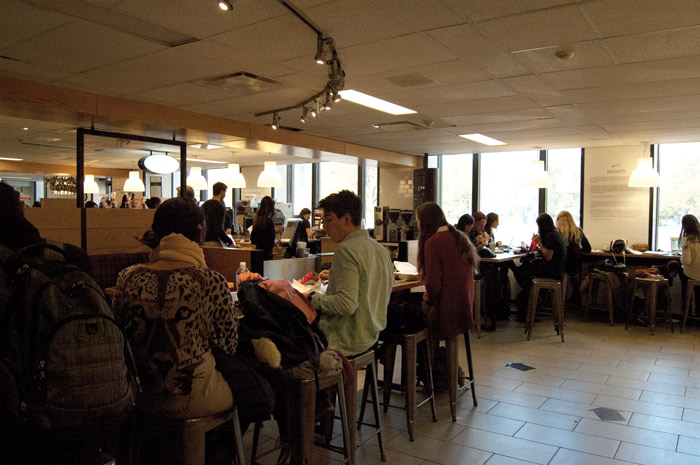With midterm season taking McGill campus in full force, student stress is reaching peak levels. Stress manifests in a variety of ways: Physical symptoms can include low energy, headaches, and insomnia, while mental symptoms can include irritation, feeling overwhelmed or depressed, and exhibiting withdrawn behaviour. One place where these symptoms become most apparent are in McGill’s cafeterias.
With five dining halls and 18 retail locations—almost all of which serve coffee—McGill Food and Dining Services is at the centre of every student’s midterm season. From early morning cappuccino fixes to late night pastry cravings, sugar and caffeine fuel the long hours spent studying. Staff are integral to the smooth operating of these student spaces; however, the people that work there are often overlooked.
Conversation between students and staff are often limited at food kiosks and checkout counters due to time constraints and long lineups. Unfortunately, some McGill staff have grown accustomed to students rushing by as exams approach and stress-levels run high.
“When [students’ exams] come, they’re so preoccupied with [them],” Bishop Mountain Hall (BMH) cook, Angelo Calamita, explained. “So when [students] come to the cash, they’ve either got something in their ear, they’re talking to someone, looking for cash […and are] not organized at all.”
The tone of these interactions are most likely fuelled by the stressful period of the year.
“When I’m in the middle of studying for midterms, it’s easy to forget to say hi to the service staff,” said Declan Embury, U0 Arts. “I feel bad about it sometimes, but there’s just so much else on my mind.”
One of the most effective ways to counteract stress, however, is to open up and talk with peers about what one is going through. While there are services to deal with stress at McGill, university food staff are an under-appreciated and friendly resource for students.
Kelsey Davis is a Royal Victoria College cafeteria staff and an archeology major. One of the most interesting parts of her job is that some students have in fact relied on her for solace.
“I’ve had a few students break down to me because I’m not in their [friend] group,” Davis explained. “All their friends have scholarships or are good students, so they don’t feel they can talk to them.”
Davis is an example of someone who understands the competition and stress that comes along with midterms and finals, and is able to offer insight.
“There’s an air at McGill that you’re supposed to do well with the least amount of effort,” she said. “When that doesn’t work out for you, it can feel isolating.”
Davis is not the only McGill food staff with valuable advice for students.
“Some students come in here excited about passing,” Rachel Durand, a cashier at the Carrefour Sherbrooke cafeteria, said. “I like to see them doing well [….] It is so much better to see them happy than depressed, and it motivates me to work harder. It makes me happy to see them happy.”
Tyrone Durand, a dish room employee at Bishop Mountain Hall (BMH) added that simply lending a sympathetic ear can offer much-needed support to stressed-out students.
“I know around midterms and final exams, everyone gets nervous,” he added. “But realize you’re smart and everything is going to be okay.”
Some students have already acknowledged the benefit of stepping out of a study mindset when grabbing a snack or a drink.
“Everyday I look forward to seeing certain employees,” Liam O’Callaghan, U0 Engineering, said. “Besides food, they serve entertaining 30-second conversations that brighten my day.”
U0 Science student Tristan Sparks also remembered a time when McGill staff helped alleviate her anxiety.
“A worker at BMH comforted me last week because I was having a panic attack over physics, and he’s a physics major,” she recalled.
While it takes time out of students’ busy study schedules to engage in conversations during these stressful times of year, both students and staff stand to benefit. Even just a short interaction can reduce stress levels among students and make staff feel appreciated and respected—a win-win situation for both parties.








